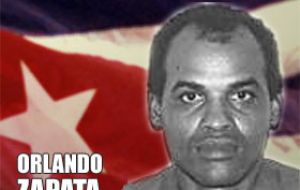MercoPress. South Atlantic News Agency
Amnesty blasts Cuba regime for “climate of fear” and 53 prisoners of conscience
 Orlando Zapata Tamayo died following a prolonged hunger strike
Orlando Zapata Tamayo died following a prolonged hunger strike Cuba has created a “climate of fear” among political activists and journalists working on the island nation, according to a report released this week by the human rights group Amnesty International.
“The laws are so vague that almost any act of dissent can be deemed criminal in some way, making it very difficult for activists to speak out against the government,” Kerrie Howard, the group's deputy Americas director, said in a statement.
The London-based organization reported that the country's court system and penal codes are used to stifle dissent and urged the government to release what it identified as 53 “prisoners of conscience.”
The Cuban government has traditionally viewed dissidents as mercenaries in the pay of foreign governments.
Cuba points to a series of clandestine actions by the United States that it says were designed to topple the country's leadership and overthrow a government installed by former Cuban president Fidel Castro in 1959.
The Amnesty report described the resulting 48 year-old U.S. trade embargo against the communist government as a “lame excuse” that Cuban leaders use to justify violating human rights.
Amnesty acknowledged that its reporting is based on “independent sources.” It has no first-hand research on the island since being banned by the Cuban government in 1990.
The country's human rights record came under intense scrutiny earlier this year after jailed Cuban dissident Orlando Zapata Tamayo died following a prolonged hunger strike.
Zapata's death sparked international condemnation from Europe and Washington and drew a rare statement of regret from Cuban President Raul Castro.
But a recent series of transfers of prisoners to jails closer to their homes, and the release of two political dissidents, have raised questions about whether Cuba is slowly changing policy toward its political prisoners.
Last week's release of jailed activist Darsi Ferrer follows a meeting between President Castro and Vatican Foreign Minister Dominique Mamberti, whose visit came amid signs of growing influence by Cuba's Roman Catholic Church.
In May, Cuba's Roman Catholic cardinal, Jaime Ortega, described a rare four-hour meeting with President Castro as a “magnificent start” to talks centered on the potential release of some of the island's jailed dissidents.
Church officials and human rights groups continue to express their desire for more prisoner releases.




Top Comments
Disclaimer & comment rulesCommenting for this story is now closed.
If you have a Facebook account, become a fan and comment on our Facebook Page!